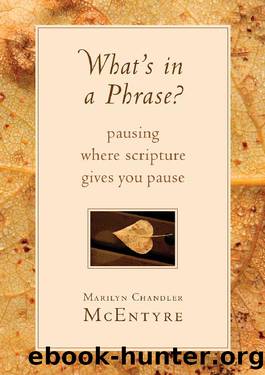What's in a Phrase? by Marilyn McEntyre

Author:Marilyn McEntyre [McEntyre, Marilyn]
Language: eng
Format: epub
Publisher: Wm. B. Eerdmans Publishing Co.
Published: 2014-04-19T22:00:00+00:00
But Jesus made no further answer, so that Pilate was amazed.
mark 15:5
One of the hardest moments to fathom in the story of Jesus’ trial and crucifixion is this one, where he first answers his judges cryptically on the matter of whether he is, in fact, “king of the Jews”: “You have said it.” Then, leaving that provocative ambiguity hanging in the bristling air, he makes “no further answer.” It is possibly the most consequential silence in history.
Why he refused to defend himself, especially when Pilate was evidently looking for an excuse to let him go, is a question that leads to much theologizing about the nature of his participation in the divine plan that led him to the cross. But what strikes me on a more personal level is the example he set in that moment of consummate restraint. Refusing to defend himself, he did, clearly, play into the hands of his executioners. But in that silence he also chose a way of wisdom I’ve remembered many times, usually belatedly, when my impulse has been to leap to my own defense.
I hate being misunderstood. I like approval. For those reasons I’m often inclined to explain myself if I think there’s any danger of misunderstanding or disapproval. I imagine I’m not alone in that inclination. Years ago I was startled into examining that habit of self-defense, however, when I asked a friend, who seemed remarkably free of the need to explain herself, and at peace with her own decisions despite others’ opinions, how she managed to avoid the temptation to defend herself when (as had happened several times) people passed judgment on her for the wrong reasons. Her answer was simple and rich with paradox: “I’ve found that it’s liberating not to defend myself.” The compulsion to self-defense, she was suggesting, is a trap. If we put our energies into assuring that no one will take our words the wrong way, object to our decisions, criticize our politics, impugn our motives, or pass judgment on our choices, we will use up a lot of the energy that could be available for more purposeful work.
Certainly clarity of intention and transparency about our motives are good, insofar as we can achieve them. Utter indifference to others’ involvement in our lives and choices is no virtue. Still, having considered and prayed and shared our processes with those who have a right to know, and then having taken action, the call of the moment changes: the time for negotiation has passed, and our task is to put our whole hearts and our “whole might” into what we have decided to do, trusting that if we have chosen wrongly, the Holy Spirit will help with course correction.
“Don’t complain, don’t explain,” my brother once said, sharing a simple credo that has served him well. Do what is given to you to do, faithfully, with sustained focus, taking the tradeoffs. “Just do it” can be a glib and simplistic way of avoiding the complexities of any process, but there is also something refreshing about that simple admonition.
Download
This site does not store any files on its server. We only index and link to content provided by other sites. Please contact the content providers to delete copyright contents if any and email us, we'll remove relevant links or contents immediately.
The 5 Love Languages: The Secret to Love That Lasts by Gary Chapman(8492)
The Space Between by Michelle L. Teichman(6085)
Assassin’s Fate by Robin Hobb(5236)
Wiseguy by Nicholas Pileggi(4585)
Everything Happens for a Reason by Kate Bowler(4067)
Gerald's Game by Stephen King(3917)
A Simplified Life by Emily Ley(3567)
The Power of Positive Thinking by Norman Vincent Peale(3446)
Pillow Thoughts by Courtney Peppernell(3393)
Resisting Happiness by Matthew Kelly(2885)
Girl, Wash Your Face by Rachel Hollis(2819)
Being Aware of Being Aware by Rupert Spira(2704)
Name Book, The: Over 10,000 Names--Their Meanings, Origins, and Spiritual Significance by Astoria Dorothy(2490)
Real Sex by Lauren F. Winner(2474)
More Language of Letting Go: 366 New Daily Meditations by Melody Beattie(2441)
The Holy Spirit by Billy Graham(2413)
Fast Facts on Defending Your Faith by John Ankerberg & John Weldon(2387)
Victory over the Darkness by Neil T. Anderson(2384)
The Secret Power of Speaking God's Word by Joyce Meyer(2251)
